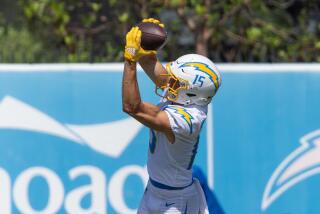Chargers Hire New Stadium Negotiator
SAN DIEGO — The San Diego Chargers have hired Mark Fabiani, former chief of staff to Mayor Tom Bradley and then a White House lawyer in the Clinton administration, to help the team negotiate for a new stadium either in San Diego or Los Angeles.
Fabiani said owner Alex Spanos prefers to remain in San Diego but if he cannot get a new stadium, he will consider moving to Los Angeles. The Chargers say they need a new stadium to remain financially competitive in one of the NFL’s smallest media markets.
Fabiani said that the proposal by billionaire Philip Anschutz to build a stadium near Staples Center will force San Diego officials to make a decision in the next few weeks.
“The Los Angeles situation is moving more quickly than anyone anticipated,” Fabiani said. “We anticipate getting a call in a month or two to consider an option to move to Los Angeles.”
Public opinion polls have shown that a large majority of San Diego voters do not want to finance a new stadium. But, Fabiani said, “We have a situation where San Diego could lose the Super Bowl forever, and could lose its pro football team to Los Angeles forever, and those two facts ought to focus people’s attention.”
Meanwhile, San Diego Mayor Dick Murphy said that he believes San Diegans need time before they confront the possibility of public participation in building a stadium. He noted that the city has completed four years of litigation over a 1998 public vote authorizing a downtown ballpark for the Padres.
“People are still recovering from the trauma of that [litigation],” Murphy said.
Murphy said he is in contact with Fabiani and a group of San Diego business executives who are dedicated to finding a way to keep the Chargers from moving. The group, headed by longtime sports booster Ron Fowler, is looking for a public-private partnership like the one approved by voters for the Padres.
“I don’t want San Diego to be in the position of St. Louis and Baltimore where a team leaves town and five years later people wake up and say: ‘What happened?’” Fowler said.
More to Read
Go beyond the scoreboard
Get the latest on L.A.'s teams in the daily Sports Report newsletter.
You may occasionally receive promotional content from the Los Angeles Times.










